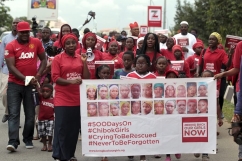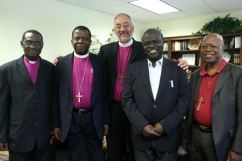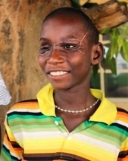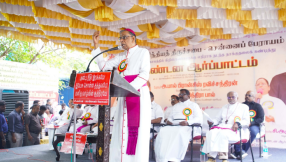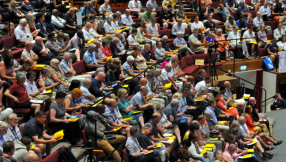The Nigeria-based Islamic terror group Boko Haram is increasingly using abducted children in staging suicide attacks, the United Nations Children's Emergency Fund (UNICEF) states in its latest report.
The U.N. humanitarian organisation notes that in 2014, Boko Haram used four children in suicide attacks. But in 2015, it used 44 children in such attacks.
UNICEF says that one in every five "suicide bombers" used by Boko Haram in the past two years has been a child, with 70 percent of them girls, many of whom had been kidnapped like the 276 Chibok schoolgirls two years ago, CBN News reports.
The girls reportedly detonated bombs in schools and markets.
"The use of children, especially girls, as so-called suicide bombers has become a defining and alarming feature of this conflict," said Laurent Duvillier, regional spokesman for UNICEF.
"It's basically turning the children against their own communities by strapping bombs around their bodies," he said.
UNICEF also reports that children suicide bombings have spread beyond Nigeria's borders, with an increasing number of deadly attacks carried out by the children with the explosives hidden under their clothes or in baskets.
Some young children probably did not know they were carrying explosives, which are often detonated remotely, Duvillier said.
The agency noted that the use of young girls to carry out suicide attacks has "created an atmosphere of fear and suspicion that has devastating consequences for girls who have survived captivity and sexual violence by Boko Haram."
Rachel Harvey of UNICEF expressed concern that many communities worry that girls and women rescued from Boko Haram have been radicalised and could still be a threat.
Meanwhile, women who had been raped by their captors—and especially those who bore children as a result—also face stigma, according to the report.
"You need strong influential voices that are going to say, 'We need to accept these girls and women back, and the children. These are victims, it was not their fault,''' Harvey said.
She believes that hostages who may have been radicalised have to be "addressed, not just dismissed."
Amnesty International estimates that Boko Haram has kidnapped about 2,000 women and girls since 2014 for use as cooks, sex slaves, fighters and "suicide bombers."
In April 2014, the group abducted some 270 Nigerian schoolgirls in Chibok, many of whom were said to have been forced to convert to Islam and marry their captors.
Two years later the girls remain missing. Last month, a girl on an apparent suicide attack mission in Cameroon reportedly cried for help and surrendered to authorities, saying she was one of the Chibok girls. If true, it would be the first concrete news of the missing girls' whereabouts in months.
In 2014, Boko Haram was dubbed as the world's deadliest terrorist organisation by the Global Terrorism Index.










